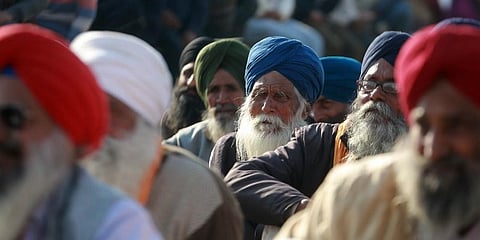

NEW DELHI: Be it scorching heat or a spell of heavy showers, nothing can dampen the morale of farmers and they will not leave the protest sites at Delhi borders till their demand for repeal of the farms laws are fulfilled, a protester at Singhu said on Friday.
Farmer leaders said while the increasing heat is posing a challenge, no hurdle is difficult enough for them to give up on their fight, and that they have equipped themselves with all necessary facilities -- be it coolers, air conditioners or provision of cold drinking water.
Delhi has been reeling under a searing heat wave for the past few days, though a spell of rain in some parts brought some relief in the evening.
"It hasn't rained in Singhu yet, but we are anticipating showers. We are farmers, and like we welcome rains in our fields back home, we will welcome the rains here too. We have protested through rains during the winters, and now we are better prepared to continue our agitation through the monsoon as well," said Lakhbir Singh.
"It is true that the heat is becoming unbearable, but farmers have also figured out ways to beat it. Farmers have installed coolers, air conditioners and fans according to their individual financial capacities," said Lakhbir Singh, vice president (Punjab) of the All India Kisan Sabha.
Though electrical appliances were put in place a few months back in anticipation of the summer, what is posing an even bigger challenge is erratic electricity supply.
According to Kirti Kisan Union (Punjab) general secretary Rachpal Singh, the frequency of power cuts have increased during the summer, with farmers having to survive the heat without electricity for "two to four hours everyday", and having no trees to offer natural shade in Singhu doesn't help.
"So many of us haven't had proper sleep for nights, because of the frequent power cuts, plus there are no trees here to cool the air," he said.
On Thursday evening, Lakhbir Singh said, a transformer near the Kundli police station broke down, and has not been fixed yet.
"A section of the protest site at Singhu has been without electricity since last evening," he said.
For water provision, the protesters have been lucky to receive help from the Rana Golden Hut dhaba located near the protest site.
Lakhbir Singh said the 'dhabawala' has provided them with water tanks which are filled with ice everyday to supply cold water.
Small water coolers have also been placed at different points across the protest site to dispense cold and clean drinking water.
"There are also freezers that have been installed within the big 'langars'," he said.
Thousands of farmers from across the country, including Punjab, Haryana and Uttar Pradesh, have been camping at the Delhi borders, including at Singhu, Tikri and Ghazipur, to protest against the three farm laws, which they fear will do away with the Minimum Support price system, and leave them at the mercy of the big corporates.
The government, however, has been projecting the laws as major agricultural reforms.
In the last seven months since November 2020, the farmers have agitated through crippling cold, rains, and now the unforgiving heat of northern India, but their spirits are only on the rise, leaders said.
"There is no doubt that protesting through this heat is difficult, but our determination to get what we want is so high that fighting the heat is nothing compared to that. We did not give up during the cold, and we are not giving up now," said Manjeet Singh, senior Vice-President of Bharatiya Kisan union (Punjab).
To him, staying away from home is an even bigger challenge.
"We have devised our ways to brave the summer. Coolers, fans and ACs have been arranged, but staying away from home is not easy. That is why, I would like to urge the government to listen to the farmers and repeal the three black laws," he said.
The unbearable heat has also taken a toll on the health of several farmers.
Lakhbir Singh said rising blood pressures and other heart problems were among the most common health problems at the moment.
"About 10 people are falling ill on a daily basis. While some get better with the treatment at the health camps here, more serious patients are sent back to their villages to take rest and recover," he said.
To ensure that the strength of protesters does not get affected, younger people from back home join the protests here, added Manjeet Singh.
"It is getting hotter by the day, so people are falling ill. That is why, when someone has to go back home to get better, younger people come here to join us, because calling off the protest is out of the question," he said.
At Ghazipur on the UP-Delhi border, several farmers have made arrangements of fans and air coolers on their tractor-trolleys while some have even installed solar power systems to charge their phones and other gadgets, BKU media-in charge Dharmendra Malik said.
Thatched roofs have replaced the tarpaulins over the temporary structures that the farmers had created for shelter during winters.
"There is unobstructed ventilation of air on the National Highway. There is shade under the flyway. Farmers find comfort in natural facilities. Some are making 'jugaad' systems for running fans and coolers," Malik said.
According to BKU office bearers, there are currently around 4,000 to 5,000 of their supporters camping at the Ghazipur border and ready to extend the protest till whenever required.